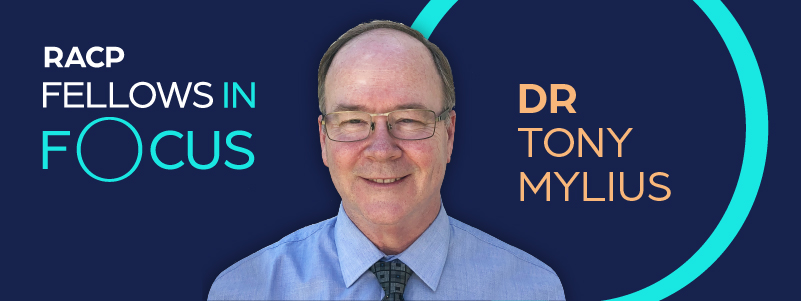RACP Fellows in Focus: Dr Tony Mylius
Date published:
20 Sep 2021

“It's not a matter of focusing on specialty medicine in Australia, but more about distributing care across the country, and the world,” Dr Tony Mylius shared when asked about how he chose his specialty in medicine.
“In terms of my motivation to be involved in cardiology and general medicine, I did dual specialty training, which allows me to engage in healthcare improvement as a clinical cardiologist and work in a regional, rural area where I can explore those opportunities and develop those values.”
Tony’s journey to success is fascinating. He grew up in Papua New Guinea until he was 16. His family then moved to Adelaide where he trained at Flinders University and Flinders Medical Centre, before working in Aotearoa New Zealand for four years in the early 1990s. He returned to Adelaide and set up practice in the Fleurieu Peninsula, south of Adelaide. Having moved to Western Australia, he worked as Regional Medical Director for the WA Country Health Service (Wheatbelt) from 2010 to 2013 and since 2012, has been a member of the Cardiovascular Health Network’s Executive Advisory Group among other roles. He is currently based in Northam in the Wheatbelt of Western Australia.
When asked about the skills he felt helped him excel as a physician, he explained, “There are a couple. Firstly, I'm a reasonably personable person and the human relationships that I have with patients and colleagues are important. I think valuing that has been reflected in my nomination for Member of the Order of Australia, which was initiated by a group of patients. It’s a great honour that they were motivated to go through that process of nominating. Secondly, general medicine encompasses more of the whole person, whereas cardiology focuses specifically on heart disease, and I think having a ‘whole person’ focus is really important.”
“There are a lot of things that we can do with patients to help them improve healthcare outcomes, particularly in terms of access to technology and innovative treatments, but people have to get to the point of care where they get access to those treatments. We know, for example, that rural and regional areas have a 30 per cent higher mortality from cardiac diseases, with a higher morbidity rate too. One of the big factors in that is the lack of access to specialist care and specialist treatment. People are unable to get to the metropolitan areas where they can get access to technology and treatments. So, one of the things that I bring to the table is providing that access point.”
For someone like Tony, working in the Western Australian region and his area of medicine, problems and challenges are plentiful, but how does he overcome challenges? Tony reflected, “The biggest challenge that I would see is building or maintaining collaboration across the health sector. Working to build bridges between private and public sectors, and between healthcare providers in order to achieve maximum health service delivery and health outcomes. For example, there are issues around the silos of what we do, but to really get the maximum bang for our buck, we should all be working in a collaborative way so that we're bringing all of our skills to the table.”
“It's about how the health system works. Some of the things that I've been involved with help build those bridges.
“My appointment at the Northam Hospital has a clinical role, but also a clinical governance and clinical leadership role. I also work in my private practice, work in the Cardiovascular Health Network in the Department of Health WA, and teach medical students in the Wheatbelt in the Rural Clinical School. It's about building bridges across all of those sectors so that we get the maximum benefit for the investment that's being made in those services."
My work in the RACP has included contributing to the development of the Model of Chronic Care Management to provide a template for improved integration of Consultant Physicians in truly patient-centred, integrated, comprehensive chronic disease care.
Although probably too early to consider hanging up his gloves, when asked about the legacy, without hesitation, Tony said, “I'd like my legacy to be that people recognise and respect that I've done my bit to try and improve the health of people and the community in a personally engaging way. Additionally, that people recognise that it's not just about the technicalities of medicine, it's about the human care we provide. If I'm remembered for that, then I'll be very grateful. Every day I'm in clinical practice I feel rewarded and often feel like I've got more out of the day than the patients have.”